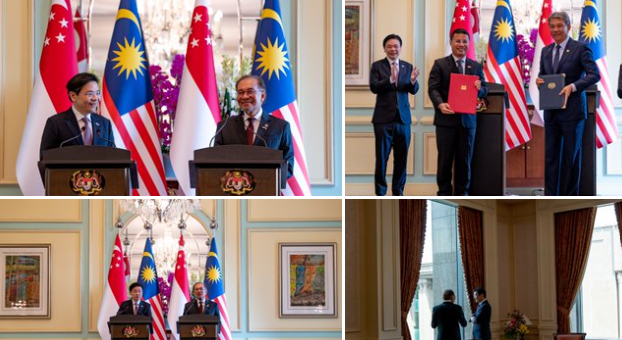
(Photo : x.com)
Malaysia's Prime Minister Anwar Ibrahim and Singapore's Prime Minister Lawrence Wong
The leaders of Malaysia and Singapore are finally gearing up to seal the deal on a long-awaited special economic zone (SEZ) linking their border region. But whether this ambitious project delivers immediate economic payoffs may depend on how smoothly it gets off the ground-a tricky task for a plan that's been delayed since talks kicked off in 2023.
Malaysia's Prime Minister Anwar Ibrahim and Singapore's Prime Minister Lawrence Wong are set to officiate the ceremony in Johor on Tuesday, according to a report by Bloomberg. Fun fact: the signing was actually pushed to January after Wong caught Covid (a reminder that even world leaders aren't immune to bad timing). The SEZ, which will span Johor, could generate 100,000 jobs and add $26 billion annually to Malaysia's economy by 2030, according to Johor officials. Much of this will likely come from Singapore-based firms expanding or relocating across the border, where land and labor are more plentiful.
The project, however, faces the usual hurdles: bureaucracy, regulatory red tape, and businesses worrying about whether Johor can match Singapore's slick efficiency. "There are concerns regarding bureaucratic capacity and the management of expectations for businesses crossing the border," said Asrul Hadi Abdullah Sani, a partner at ADA Southeast Asia.
Johor's proximity to Singapore has always been its golden ticket. Case in point: a recent surge in data centers in Johor, spurred by Singapore's 2019-2022 moratorium on new ones due to energy concerns. But while Malaysia has grand plans for passport-free travel and QR-code-based border systems, implementation has been sluggish-especially compared to Singapore, which has already nailed these processes.
Spanning over 3,500 square kilometers (more than four times the size of Singapore), the SEZ aims to emulate China's Shenzhen. Yet, history has shown that strengthening ties between Johor and Singapore isn't easy. With over 300,000 people crossing their land border daily, delays on the two causeways are already legendary. Plus, Malaysia's 24% corporate tax rate remains a sticking point compared to Singapore's 17%.
"The draw of the SEZ will come down to tax incentives," said Yvonne Beh of Wong & Partners. "Companies want customs duties and sales tax exemptions at a minimum before they consider setting up in Johor." Whether this SEZ delivers on its bold promises-or gets bogged down in the usual hurdles-remains to be seen.
This deal may just be the start of an economic transformation-or a long road full of speed bumps. Either way, it's a bold step forward for two neighbors who are betting big on a shared future.
* This is a contributed article and this content does not necessarily represent the views of btin.co.in









